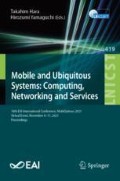Abstract
World Health Organization (WHO) reported that viruses, including COVID-19, can be transmitted by touching the face with contaminated hands and advised people to avoid touching their face, especially the mouth, nose, and eyes. However, according to recent studies, people touch their faces unconsciously in their daily lives, and it is difficult to avoid such activities. Although many activity recognition methods have been proposed over the years, none of them target the prediction of face-touch (rather than detection) with other daily life activities. To address to problem, we propose TouchAlert: a system that automatically predict the occurrence of face-touch activity and warn the user before its occurrence. Specifically, TouchAlert utilizes commodity wearable devices’ sensors to train a deep learning-based model for predicting the variable length face-touching of different users at an early stage of its occurrence. Our experimental results show high accuracy of F1-score of 0.98 and prediction accuracy of 97.9%.
Access this chapter
Tax calculation will be finalised at checkout
Purchases are for personal use only
Notes
- 1.
Even experts cannot avoid face touch activity: https://youtu.be/mA1wqjaeKj0.
References
Abbas, M., Elhamshary, M., Rizk, H., Torki, M., Youssef, M.: WiDeep: WiFi-based accurate and robust indoor localization system using deep learning. In: Proceedings of the International Conference on Pervasive Computing and Communications (PerCom). IEEE (2019)
Alkiek, K., Othman, A., Rizk, H., Youssef, M.: Deep learning-based floor prediction using cell network information. In: Proceedings of the 28th International Conference on Advances in Geographic Information Systems, pp. 663–664 (2020)
Amano, T., Yamaguchi, H., Higashino, T.: Connected AR for combating COVID-19. IEEE Internet Things Mag. 3(3), 46–51 (2020)
Grunwald, M., Weiss, T., Mueller, S., Rall, L.: EEG changes caused by spontaneous facial self-touch may represent emotion regulating processes and working memory maintenance. Brain Res. 1557, 111–126 (2014)
Kingma, D.P., Ba, J.: Adam: a method for stochastic optimization. arXiv preprint arXiv:1412.6980 (2014)
Kwok, Y.L.A., Gralton, J., McLaws, M.L.: Face touching: a frequent habit that has implications for hand hygiene. Am. J. Infect. Control 43(2), 112–114 (2015)
Michelin, A.M., et al.: FaceGuard: a wearable system to avoid face touching. Front. Robot. AI 8, 47 (2021)
Radu, V., et al.: Multimodal deep learning for activity and context recognition. In: Proceedings of the ACM on Interactive, Mobile, Wearable and Ubiquitous Technologies, vol. 1, no. 4, pp. 1–27 (2018)
Rizk, H.: Device-invariant cellular-based indoor localization system using deep learning. In: The ACM MobiSys 2019 on Rising Stars Forum, pp. 19–23. ACM (2019)
Rizk, H.: SoloCell: efficient indoor localization based on limited cell network information and minimal fingerprinting. In: Proceedings of the 27th ACM SIGSPATIAL International Conference on Advances in Geographic Information Systems, pp. 604–605 (2019)
Rizk, H., Abbas, M., Youssef, M.: OmniCells: cross-device cellular-based indoor location tracking using deep neural networks. In: 2020 IEEE International Conference on Pervasive Computing and Communications (PerCom), pp. 1–10. IEEE (2020)
Rizk, H., Abbas, M., Youssef, M.: Device-independent cellular-based indoor location tracking using deep learning. Pervasive Mob. Comput. 75, 101420 (2021)
Rizk, H., Shokry, A., Youssef, M.: Effectiveness of data augmentation in cellular-based localization using deep learning. In: Proceedings of the International Conference on Wireless Communications and Networking (WCNC). IEEE (2019)
Rizk, H., Torki, M., Youssef, M.: CellinDeep: robust and accurate cellular-based indoor localization via deep learning. IEEE Sens. J. 19, 2305–2312 (2018)
Rizk, H., Yamaguchi, H., Higashino, T., Youssef, M.: A ubiquitous and accurate floor estimation system using deep representational learning. In: Proceedings of the 28th International Conference on Advances in Geographic Information Systems, pp. 540–549 (2020)
Rizk, H., Yamaguchi, H., Youssef, M., Higashino, T.: Gain without pain: enabling fingerprinting-based indoor localization using tracking scanners. In: Proceedings of the 28th International Conference on Advances in Geographic Information Systems, SIGSPATIAL’20, pp. 550–559. Association for Computing Machinery, New York (2020)
Rizk, H., Youssef, M.: MonoDCell: a ubiquitous and low-overhead deep learning-based indoor localization with limited cellular information. In: Proceedings of the 27th SIGSPATIAL International Conference on Advances in Geographic Information Systems. ACM (2019)
Ronao, C.A., Cho, S.B.: Human activity recognition with smartphone sensors using deep learning neural networks. Expert Syst. Appl. 59, 235–244 (2016)
Shen, K., et al.: Diagnosis, treatment, and prevention of 2019 novel coronavirus infection in children: experts’ consensus statement. World J. Pediatr. 16(3), 223–231 (2020)
Srivastava, N., Mansimov, E., Salakhudinov, R.: Unsupervised learning of video representations using LSTMs. In: International Conference on Machine Learning, pp. 843–852. PMLR (2015)
Sudharsan, B., Sundaram, D., Breslin, J.G., Ali, M.I.: Avoid touching your face: a hand-to-face 3D motion dataset (COVID-away) and trained models for smartwatches. In: 10th International Conference on the Internet of Things Companion, pp. 1–9 (2020)
Zhang, J., Kumar, S.: NoFaceContact: stop touching your face with NFC. In: Proceedings of the 18th International Conference on Mobile Systems, Applications, and Services, pp. 468–469 (2020)
Acknowledgement
The work was supported by “Research and Development of Information and Communication Technologies that Contribute to Countermeasures against Infectious Diseases (222-C03)”, the Commissioned Research of National Institute of Information and Communications Technology (NICT), JAPAN.
Author information
Authors and Affiliations
Corresponding author
Editor information
Editors and Affiliations
Rights and permissions
Copyright information
© 2022 ICST Institute for Computer Sciences, Social Informatics and Telecommunications Engineering
About this paper
Cite this paper
Rizk, H., Amano, T., Yamaguchi, H., Youssef, M. (2022). Smartwatch-Based Face-Touch Prediction Using Deep Representational Learning. In: Hara, T., Yamaguchi, H. (eds) Mobile and Ubiquitous Systems: Computing, Networking and Services. MobiQuitous 2021. Lecture Notes of the Institute for Computer Sciences, Social Informatics and Telecommunications Engineering, vol 419. Springer, Cham. https://doi.org/10.1007/978-3-030-94822-1_29
Download citation
DOI: https://doi.org/10.1007/978-3-030-94822-1_29
Published:
Publisher Name: Springer, Cham
Print ISBN: 978-3-030-94821-4
Online ISBN: 978-3-030-94822-1
eBook Packages: Computer ScienceComputer Science (R0)

